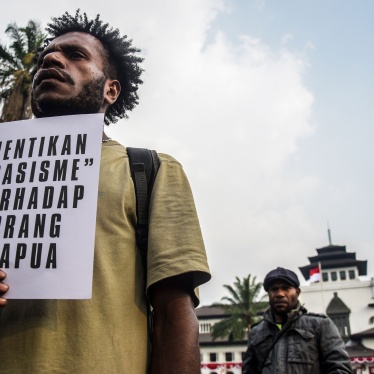As a member of the United Nations Human Rights Council, Angola should reconsider its March 2008 order that the UN Office of the High Commissioner for Human Rights (OHCHR) in Angola cease activities by the end of May 2008, Human Rights Watch said today.
“Angola is going back on its word to support a constructive dialogue and increased cooperation with the UN human rights office,” said Georgette Gagnon, Africa director at Human Rights Watch. “The government made that commitment in writing to the president of the UN General Assembly before joining the Human Rights Council in May 2007. Angola should keep its promises.”
The closure of the OHCHR field office in Angola comes three months ahead of Angola’s parliamentary elections scheduled for September 5-6, 2008 – the first to be held in the country since 1992.
“The Angolan government’s decision to shut down this important human rights office signals growing government intolerance of human rights scrutiny and other criticism in the run-up to September’s elections,” said Gagnon. “It’s worrying that the already limited space for human rights defenders could be restricted further.”
The government issued its order shortly after the UN Working Group on Arbitrary Detention and the UN Special Rapporteur for the Freedom of Religion or Belief made public their Angola mission reports at the 7th session of the Human Rights Council in March 2008. Angolan officials rejected out of hand many of the working group’s findings, denying there had been any case of torture and claiming excessive pre-trial detention in Angola had stopped by the end of 2007.
The Angolan government has sought to justify its decision to close the OHCHR office on the grounds that the presence of the office in Angola is no longer necessary now that peace and democratization has been consolidated and functioning national human rights institutions established. The government has also stated that the office had no legal status in the country and as such never existed. Moreover, in March 2008, the minister of justice suggested at the Human Rights Council that the UN high commissioner for human rights’s criteria for establishing field offices were not transparent and may have “political motivations.”
As Human Rights Watch has found, peace has still not taken root in the enclave of Cabinda, and national human rights institutions such as the Provincial Human Rights Committees are yet not fully operational. The government continues to restrict the activities of independent media in much of the country.
The government’s argument that the OHCHR had no legal status is not convincing since it had agreed that the office should continue technical cooperation in Angola after the departure of the UN peacekeeping mission in 2003. The OHCHR field office has played an important role, assisting the government in establishing national human rights institutions and alternative justice mechanisms, drafting reports to UN human rights bodies and training the police to be more aware of human rights. It also facilitated access for Angolan nongovernmental organizations to UN human rights mechanisms.
In 2007, the OHCHR tried to persuade the government to permit the office to operate with a full human rights protection mandate. This would have been a major step toward sustaining ongoing reform efforts and ensuring an open environment for human rights defenders in the country.
Human rights defenders told Human Rights Watch how the OHCHR’s presence in Angola guaranteed them some degree of protection from government intimidation. This is particularly important as civil society organizations are increasingly worried about the government’s ongoing revision of the legal framework governing civil society, which could again threaten their existence. In 2007, government officials publicly accused several organizations of illegal activities, without ever substantiating such claims, and threatened to close the organizations.
Human Rights Watch called on the government of Angola to immediately reestablish dialogue with the OHCHR and quickly negotiate a solution that strengthens human rights capacity and allows for effective UN human rights monitoring to be resumed in the country. Human Rights Watch also urged the government to guarantee space for national and international civil society to operate freely in Angola before and after the upcoming elections in September.






